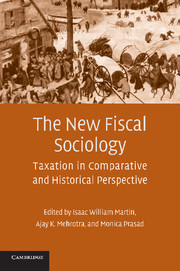Book contents
- Frontmatter
- Contents
- List of Contributors
- Acknowledgments
- Foreword
- 1 The Thunder of History: The Origins and Development of the New Fiscal Sociology
- PART ONE SOCIAL SOURCES OF TAXATION: AMERICAN TAX POLICY IN COMPARATIVE PERSPECTIVE
- PART TWO TAXPAYER CONSENT
- 6 The Politics of Demanding Sacrifice: Applying Insights from Fiscal Sociology to the Study of AIDS Policy and State Capacity
- 7 The End of the Strong State?: On the Evolution of Japanese Tax Policy
- 8 War and Taxation: When Does Patriotism Overcome the Free-Rider Impulse?
- 9 Liberty, Democracy, and Capacity: Lessons from the Early American Tax Regimes
- PART THREE THE SOCIAL CONSEQUENCES OF TAXATION
- References
- Index
9 - Liberty, Democracy, and Capacity: Lessons from the Early American Tax Regimes
Published online by Cambridge University Press: 13 January 2010
- Frontmatter
- Contents
- List of Contributors
- Acknowledgments
- Foreword
- 1 The Thunder of History: The Origins and Development of the New Fiscal Sociology
- PART ONE SOCIAL SOURCES OF TAXATION: AMERICAN TAX POLICY IN COMPARATIVE PERSPECTIVE
- PART TWO TAXPAYER CONSENT
- 6 The Politics of Demanding Sacrifice: Applying Insights from Fiscal Sociology to the Study of AIDS Policy and State Capacity
- 7 The End of the Strong State?: On the Evolution of Japanese Tax Policy
- 8 War and Taxation: When Does Patriotism Overcome the Free-Rider Impulse?
- 9 Liberty, Democracy, and Capacity: Lessons from the Early American Tax Regimes
- PART THREE THE SOCIAL CONSEQUENCES OF TAXATION
- References
- Index
Summary
The idea that the study of early American history offers anything useful for contemporary policy makers, at home or abroad, is rather a stretch. To think about rewriting the American portions of W. W. Rostow's Stages of Economic Growth today is to think about recommending the equivalent of murdering Indians and enslaving Africans to encourage the “take-off into self-sustained economic growth” (Rostow 1960). At the same time, however, the federal structure of the American polity offers opportunities for comparative historical research with built-in controls over some of the variables. My work on eighteenth-century American tax policy exploits these opportunities by comparing colonies with much common experience: overwhelmingly Protestant settler populations, similar relationships to the same imperial bureaucracy, and comparable levels of integration into the commercial systems of the Atlantic economy. Yet these colonies (and the states that succeeded them after 1776) produced strikingly different tax structures. As the U.S. Treasury Secretary Oliver Wolcott, Jr., would notice in 1796, the tax systems of the North were more sophisticated than the tax systems of the South, taxing larger ranges of property in more sophisticated ways. In particular, the northern colonies (and then states) were much more likely to possess enough administrative capacity to assess the value of property (Einhorn 2006a).
An explanation of this difference requires us to look at the other differences between the northern and southern colonies (states). The most obvious contrast is well known: the far greater reliance on slavery in the South.
- Type
- Chapter
- Information
- The New Fiscal SociologyTaxation in Comparative and Historical Perspective, pp. 155 - 172Publisher: Cambridge University PressPrint publication year: 2009
- 4
- Cited by



